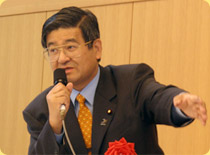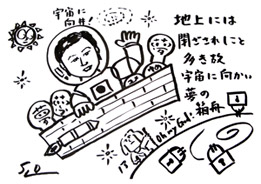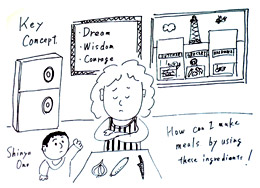Matogawa: Today, panelists with different occupations are going to share with us their perspectives on the theme “Building Japan’s Future in Space.” The first panelist is Representative Shinya Ono. He studied astronautics, and later was with the Institute of Space and Astronautical Science (ISAS). He is currently the Chief Secretary of Space Development Diet Organization.

 I would like our guests from overseas to recognize that Japan’s space development has its own unique style. This illustration (* image 1) should make my point. The illustration is accompanied by a genre of Japanese poetry called tanka, which consists of 31 syllables, 5-7-5-7-7. The lady waving her hand is Astronaut Mukai, and the style is like Manga, which is a popular artform in Japan. I would like our guests from overseas to recognize that Japan’s space development has its own unique style. This illustration (* image 1) should make my point. The illustration is accompanied by a genre of Japanese poetry called tanka, which consists of 31 syllables, 5-7-5-7-7. The lady waving her hand is Astronaut Mukai, and the style is like Manga, which is a popular artform in Japan.
 image 1 image 1
|
 image 2 image 2
|
Life on the Earth
enshrined in limitation.
Looking to the stars
we set free an ark of dreams
to the vastness of space.
The meaning of the tanka is this: Recently, problems with the environment and food have come to the surface, and more and more people seem to be under the impression that the Earth is gradually becoming an unpleasant place to live. When fewer and fewer dreams are shared in our society, it is time to send an ark of dreams into space. Pack it full of dreams, and let it sail into space, where there are no borders. People from different cultures, with different religions, will live on a space station, and a new concept for humankind will be created. And by introducing it to our world, we will probably be able to find clues to a new era of human society on Earth. This is the idea that I would like to advocate.
The next illustration (*image 2) is a woman with crossed arms, looking troubled because she has only a sausage and an onion on the counter in front of her, and is puzzled by what to cook with the little she has. But there is a refrigerator behind her to the left. Does she know what’s in the fridge? Is she using her ingredients well? She might even have forgotten what is stored deep in the fridge. Also, through the window behind her to the right are a butcher, a grocery store and a hardware store. If she bought a few items there, she would have a lot more options.
The same is true of space development. Those who are working in the field of space probably have the impression that the possibilities are becoming narrower as budgets are reduced each year. I would like to suggest that this is when international collaboration comes in, and helps expand our possibilities. I think that the key words for space development at a time like this are “dreams,” “wisdom,” and “spirit.” Can we have dreams that everyone can share as mutual goals?
To make these dreams come true, will it be possible for us to gather wisdom and develop better ideas? And will we specialists in space development be able to share and maintain our spirit, which is the energy that keeps us moving toward our goals, and towards the future? These are the questions I would like to pose. Sharing big dreams to capture and unite the hearts of the world, moving forward with strong determination, and choosing and following a just path guided by wisdom --- I think this is the fundamental attitude we need to inspire, in order to encourage space development.
Matogawa: Thank you for your speech full of dreams. Mr. Ono is also actively promoting a movement to bring out dreams, wisdom and spirit. The next speaker is Astronaut Chiaki Mukai, who has been to space twice. Could you give us your opinion on the direction we should take for further advancement? |

